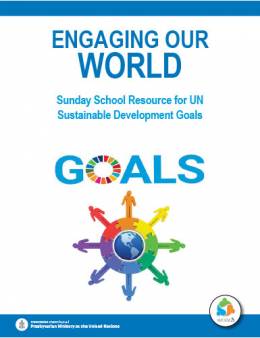
Welcome to a study of the UN’s Sustainable Development Goals. This leader guide is intended to accompany the Second Edition of the “Study and Devotional Guide on the United Nations’ Sustainable Development Goals.” It is a tool to help introduce groups to these goals and to explore them more deeply with the hope that persons, together and as individuals, may find meaningful ways to engage the goals and take action.
In his letter of introduction to the Second Edition, Ryan D. Smith, director of the Presbyterian Ministry at the United Nations, notes that the resource gives us a snapshot into each of the 17 Sustainable Development Goals (SDGs), some of their targets and the ways in which the Presbyterian Church (U.S.A.) and our global partners have been working — and continue to work — to achieve this sustainable development agenda. The resource includes:
- A fact sheet for each goal.
- Biblical reflections from staff and mission partners reflecting on each goal and examining it through the lens of Mathew 25.
- Information highlighting the work of the PC(USA) and our partners.
- A bibliography of relevant printed resources (hyperlinks for sites with the same information are included in the online resource).
At first glance, the 17 SDGs are daunting in both their scope and depth. Studying and addressing all of the SDGs in one course may seem to be an impossible task. It may be helpful for both leaders and participants to keep the following in mind:
- The study intends to present a snapshot. No six-session study could possibly be comprehensive; rather it gives participants the opportunity to become more familiar with this important agenda as each session introduces participants to several SDGs.
- The leader’s guide employs four different approaches to small group work, each in a separate session. As leader, you may
employ all four ways with pairs or small groups of participants, or you may choose to use only one or two approaches. Choose
activities that best suit both your group of participants and your own leadership style. - The overall goal of such a study must be to go beyond simply becoming familiar with the SDGs. Rather the hope is that participants will commit to responding to the SDGs in one or more specific ways. Some persons may identify a particular project or program of the church, either locally or globally, to which they might commit time, financial resources or other support. Individually or as a congregation, others may find effective ways to advocate for legislation or other actions that are consistent with the work of the SDGs. Regardless of other responses, all participants can commit to sustained prayer.